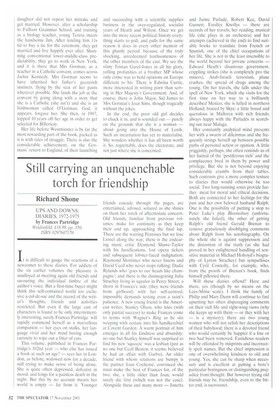Still carrying an unquenchable torch for friendship
Richard Shone
UPS AND DOWNS: DIARIES, 1972-1975 by Frances Partridge Weidenfelcl, £18.99, pp. 350,
ISBN 0297607170
It is difficult to gauge the reactions of a newcomer to these diaries. For addicts of the six earlier volumes the pleasure is unalloyed at meeting again old friends and savouring the individual timbre of the author's voice. But a first-time buyer might think this self-contained world too exclusive a cul-de-sac and the record of the writer's thoughts, friends and activities restricted. But even if the large cast of characters is found to be only intermittently interesting, surely Frances Partridge will rapidly commend herself as a marvellous companion — her eyes on stalks, her language vivid and her mind having enough curiosity to wipe out a litter of cats.
This volume, published in Frances Partridge's 102nd year — who else has issued a book at such an age? — sees her in London, as before, widowed now for a decade, still trying to make sense of being alone. She is quite often depressed, defeatist in mood, and longs for a painless death in the night. But this by no account means her world is empty — far from it. Younger friends cascade through the pages, are entertained, advised, solaced as she shines on them her torch of affectionate concern. Old friends, familiar from previous volumes, make for continuity as they keep their end up, approaching the final lap. There are the warring Penroses but we lose Lionel along the way; there is the endearing music critic Desmond Shawe-Taylor with his fussifications, lost opera tickets and subsequent lobster-faced indignation; Raymond Mortimer who never listens and David Cecil who never stops talking; Dadie Rylands who 'goes to our heads like chainpagne'; and there is the disintegrating Julia Strachey living in squalor in Percy Street, a thorn in Frances's side (they were friends from girlhood) with her self-centred, impossible demands testing even a saint's patience. A new young friend is the American writer, Stanley Olson, who tries (with only partial success) to make Frances come to terms with Wagner's Ring as he sits weeping with ecstasy into his handkerchief at Covent Garden. A warm portrait of him emerges in all his kindness and absurdity: no one but Stanley himself was surprised to find his new 'squeeze' was a lesbian (just as no one but Cecil Beaton. it seems, believed he had an affair with Garbo). An older friend with whom relations are bumpy is the painter Joan Cocheme, convinced she must make the best of Frances for, of the two, she, a little older than Joan, would surely die first (which was not the case). Alongside these and many more — Janetta






















































































 Previous page
Previous page